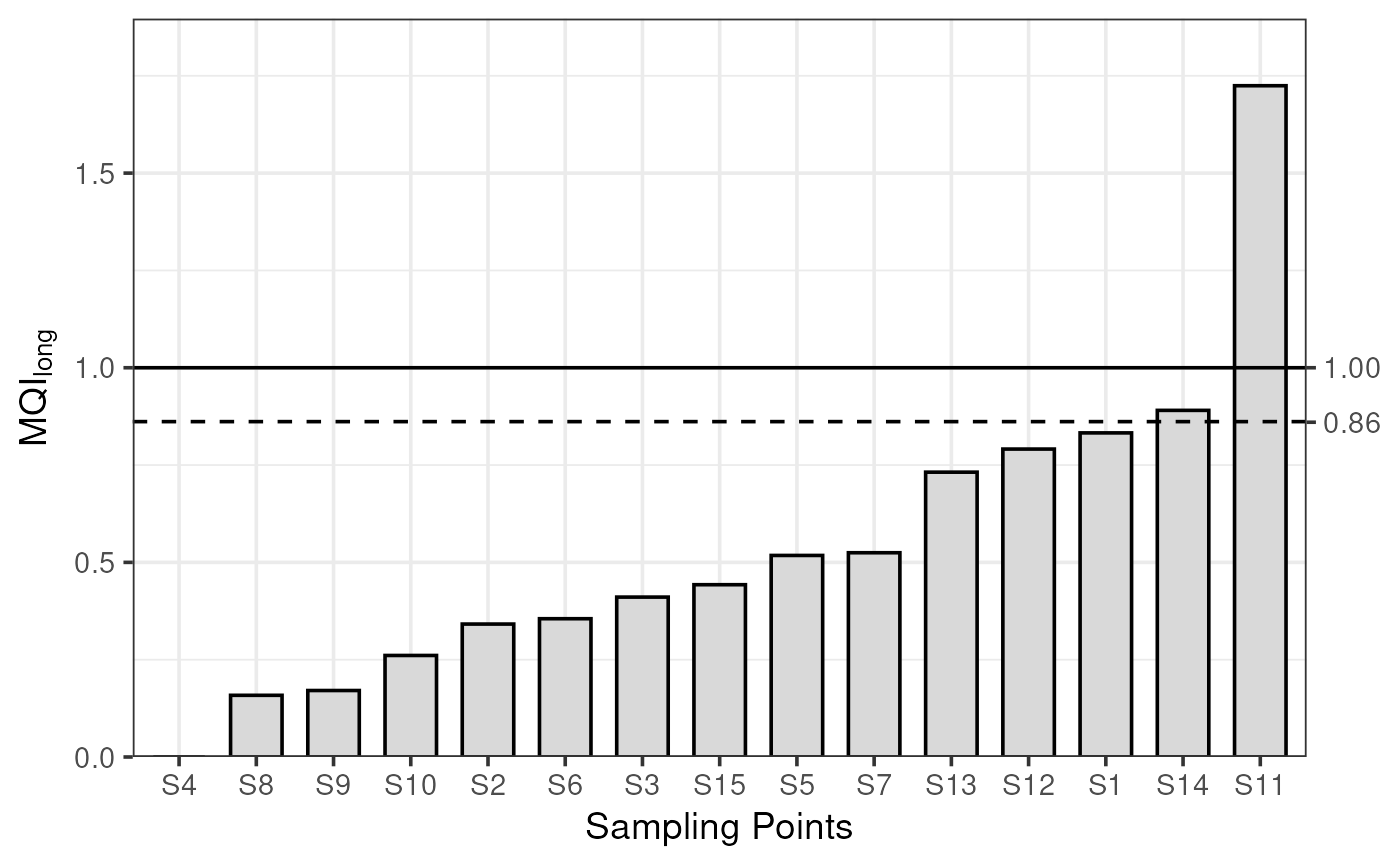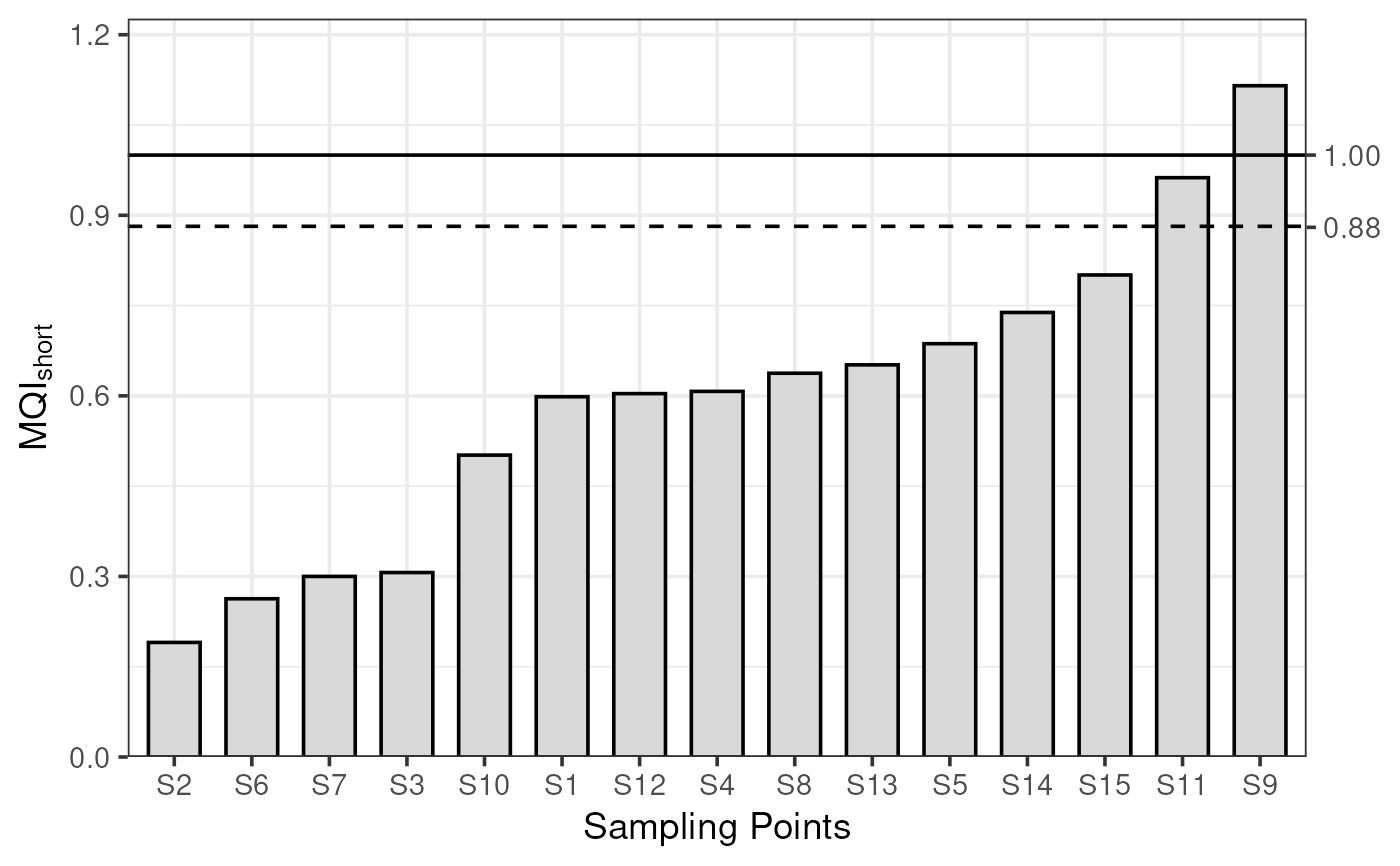Plot a bar chart visualising the Modelling Quality Indicator (MQI)
plot_mqi_bars.RdThis function produces an ordered bar chart visualising the modelling quality
indicator (MQI) for each site in the dataset. It also draws the 90th
percentile of MQIs as a horizontal line; if this is below unity (1) the
Modelling Quality Objective has been met. Unlike plot_comparison_bars(),
both long-term and short-term MQIs/MQOs are visualised identically - although
input params and calculated mqi and mqo values will differ.
Usage
plot_mqi_bars(
stats,
stats2 = NULL,
color_bars = "grey85",
color_outline = "black",
show_annotations = FALSE,
title = NULL,
interactive = FALSE,
gp = grid::gpar(fontsize = 10)
)Arguments
- stats, stats2
The output of
summarise_mqo_stats(). All relevant information (e.g.,term,params_fixed, etc.) will be passed to this function from the statistics object.statsis compulsory andstats2optional. If both are provided,statsandstats2should be different terms (one short and one long). In that case, short-term stats are plotted preferentially but the long-term stats will be annotated ifshow_annotations = TRUE.- color_bars, color_outline
The colours to use to fill the bars, and for the outlines/horizontal lines. Can be expressed as hex codes, or any colours listed in
colors().- show_annotations
Should the figure be annotated with input parameters and complementary performance indicators? These are useful extra detail, but can overcrowd the plotting area.
- title
An optional title for the plot. This will appear directly above the plot area, regardless of whether
interactiveisTRUEorFALSE.- interactive
If
FALSE, the default, a staticggplot2graphic will be returned which can be saved as a PNG, SVG, or other similar format. IfTRUE, a dynamic HTML widget will be returned created byplotly.- gp
A
grid::gpar()object passed togrid::textGrob(), used to control the appearance of the parameter & indicator annotations whenshow_annotations = TRUE.fontsizeis likely the most useful argument, but many options are available throughgrid::gpar(). Only thefontsizeargument is used wheninteractive = TRUE.
See also
Other plotting functions:
plot_comparison_bars(),
plot_mqi_report(),
plot_mqi_scatter(),
plot_timeseries()
Examples
plot_mqi_bars(
summarise_mqo_stats(demo_longterm, pollutant = "PM10")
)
#> ! term assumed to be 'long'.
#> ℹ If this is incorrect, please specify the data's term using the term argument.
#>
#> ! Using fixed long-term annual pm10 parameters.
#> ℹ If this is incorrect, please use `mqor::mqo_params()` or
#> `mqor::mqo_params_default()` to construct a parameter set.
#>
 plot_mqi_bars(
summarise_mqo_stats(demo_shortterm, pollutant = "PM10")
)
#> ! term assumed to be 'short'.
#> ℹ If this is incorrect, please specify the data's term using the term argument.
#>
#> ! Using fixed short-term daily pm10 parameters.
#> ℹ If this is incorrect, please use `mqor::mqo_params()` or
#> `mqor::mqo_params_default()` to construct a parameter set.
#>
plot_mqi_bars(
summarise_mqo_stats(demo_shortterm, pollutant = "PM10")
)
#> ! term assumed to be 'short'.
#> ℹ If this is incorrect, please specify the data's term using the term argument.
#>
#> ! Using fixed short-term daily pm10 parameters.
#> ℹ If this is incorrect, please use `mqor::mqo_params()` or
#> `mqor::mqo_params_default()` to construct a parameter set.
#>
